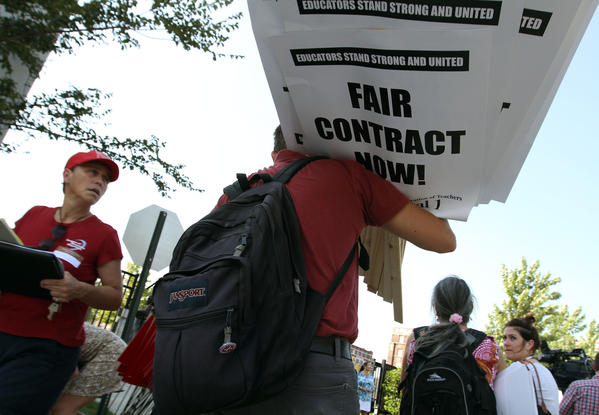It’s Election Day in Illinois; the greatest emblem of participation in our democracy and civic life.
I guess that’s why it struck me as extremely ironic when I read on the Chicago Tribune website that the Chicago Teachers Union has doubled down on its plan to implement what amounts to a one-day strike on April 1st. It seems that the union has inclined itself toward a misguided strategy of non-participation in a time that calls for vigorous involvement.
As stated by union leaders in the Tribune article, the aim of the proposed protest is to build pressure on the mayor and the governor to create “new taxes and revenue for public education.” Now, I’ve been singing that song since about 2006 (when advocates for new revenue were trying to avoid the present crisis) and am more convinced today than ever that new revenue is a necessary part of the way forward for our school system.
My concern is what seems to be the proposed strategy for getting there.
I get it that the goal is to exact a political price from a mayor you despise and a governor who refuses to play nice in the sandbox that is state government. But, does this tactic get us any closer to meaningful school-funding reform? And any progress that does take place, is it worth the academic and financial cost that children and families will have to pay?
Sure, a teacher walk-out will get great media coverage. It will certainly create opportunities for union leaders to stand up at rallies and sound off about how bad things are and why we need to figure out how to pay for upgrading an outdated education system that has failed to keep pace with changes in the population, changes in the economy and generational failure in the classroom.
But what do we really get? The goal of political action is to force the hand of your political target by giving them an experience that they cannot endure. It’s about changing the balance of power. But who really gets hurt by a walk-out?
I’m sure the mayor would much rather that teachers be in their classrooms on April 1st. But on April 2nd all that will have happened is a news cycle that says “the CTU hates the mayor”—which really isn’t news. And Gov. Bruce Rauner will almost certainly be unbothered by a CTU protest. It will only serve to reinforce the governor’s misguided views of organized teachers. And the teachers who walk out will still get their salaries.
The real cost of this protest will be born by CPS students who will lose another day of learning time, something they can’t afford to give up. The dramatic negative impact of missing days of school has been well established.
The cost will be born by those parents working low-wage, hourly jobs who have to take a day off or pay for unexpected childcare expenses in order to accommodate this “day of action.”
I would much rather have seen the Chicago Teachers Union get involved today in some primary races across the state, helping put legislators in Springfield (on both sides of the aisle) who understand that new revenues are needed for education and who won’t allow the governor to hold the budget as ransom for a mostly out-of-touch agenda. I’d much rather see the union teaming up with CPS top brass and others throughout the rest of the state to push a real school funding reform bill in the statehouse.
Last week I wrote about why you’d never be able to get my mom on board with the “opt out” movement (another disengagement tactic that presents real challenges for the most vulnerable students). This Election Day, I’d rather see the union encouraging people to find creative ways to engage in the process and drive real change, rather than planning political theater that leaves students and families holding the bag.
Latest posts by Chris Butler (see all)
- Fellow Parents of Color, We Really Can Do This Homeschooling Thing - April 13, 2020
- Elected School Board Is A Distraction, Not A Solution - March 20, 2017
- 3 Stupid, Racist Responses to Chance’s $1 Million Dollar Action - March 7, 2017
